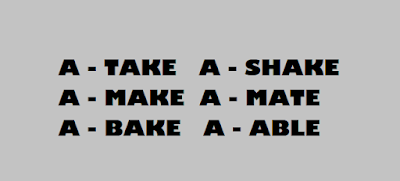By Abdul Azeez Sulaiman
As linguists say, morphology is a subgroup of grammar,
which is solely based on how new words are formed. Delighted I was when I understood
and knew how morphology works. Because without morphology we would have been tasked
with the heavy burden of word memorizing.
So without more Ado, it is catigorised into two by linguists: the free one and bound one.
Scholars' postulation on the former is that it consists of
bare words which have independent meaning while they posited that the latter
composes words which couldn't assert meaningful thought isolatedly until they
are added to the free one.
Among the instruments and tools used to add the bound to the
free with a view to communicating new words are what grammarians coined :
Derivational & Inflectional morphemes.
On this, derivational morphemes work when an affix is added to either at the beginning of a word and calls it a prefix or at the end of a base word and call it a suffix.
Obviously, most time when
this affix is added to a word, the grammatical class of that word usually
changes from the environment it is to another grammatical environment. Although
not every time as it doesn't change it
sometimes rather just changes the meaning of the word.
Meanwhile, the existence of a stationary pattern for
derivational morphemes make it sometimes
easy for students of grammar to form a new word. However, students often make
mistakes when forming new words due to the just concentration and attention
they pay to it.
To make the mistakes and errors made by students solvable, this piece has come to the fore to make a vivid
clarification to some overt things in "Able" when using to create a
new word class called Adjective.
The first errors that must be attended to are the hectic
mistake. Students make this mistake due to the subtle nature of
"ABLE".
This is how it happens.
Ordinarily, when the word 'able' is in an isolated room, the way
it is pronounced is quite different from how it will be pronounced when it is
seen in a room with the verb to act as an adjective.
For instance, the 'a' in able is pronounced like the "a" in words; take, make, bake, and so on if it is in the solitary state but the moment it moves beyond that, the pronunciation
will change to the last vowel in 'bottle', mottle and so on whenever it is
used with a verb. In other words, when Able is added to a base form verb. The "a" that starts the able must not be pronounced as 'a' in lake, take and make. Students
mostly make this mistake when pronouncing the 'a' in ABLE as they do pronounce it as
/ei/ in take, clay, and cake. Nevertheless
the correct pronunciation is the silent
A. Linguists do call it SHWA symbol which is the last vowel in the word bottle, mottle and
knuckle.
So pay a keen attention to that.
Another error that must be avoided when forming a new words
with Able is the syntactic error.
Students do also make mistakes here. They do so by adding
able to all verbs they see by not discriminating many a verb that has dissociated itself from embracing the suffix
"Able."
I laughed mockingly at my brother two days ago when I was conversing with him.
Someone came to our house asking for my sister. As soon as
we told her that she was not around. She left immediately without hesitating, for this, we couldn't have the opportunity of looking at her very well.
After she has gone, I asked my brother if he knew who she
was.
"I don't, you know I couldn't look at her face because
her face is not even lookable" he said.
I just gave him a
mockery laugh.
So not all verbs can accommodate ABLE.
For instance, as u can say
readable, buyable, eatable, and ridable and use them in sentences like:
The book is readable
Oh! What a buyable fruit!
The food is eatable
The bicycle is ridable.
You can't say sitable, abstainable, runnable, lookable and use them in sentences like:
The bench is sitable.
That behavior must be abstainable.
The place is runnable.
Her face is lookable.
What is the reason
for that?
The certain reason is just that not all verbs do take Able.
So what are we going to do now? Are we going to memorize all
the verbs that do take Able? What if we
memorize it and change later occurs since every human language is in a constant
state of change?
Don't worry it is not taxing work. It is very simple.
If u give a careful look to those aforementioned examples, u
see that the examples in section "A" compose verbs that are
transitive while on the other hand, the second section consists of verbs that
are intransitive.
So the word Able has a healthy intimacy with the object of
the verb u want to add ABLE to and has nothing to do with any verb that does
not have an object, leaving intransitive uu attending to.
See the relationship:
I wash the bicycle
The bicycle is washable.
I eat the food
The food is eatable.
Hence, the intransitive verb does not have an object and able
cannot do without it. So Able must not be added to the Intransitive verb to form an adjective
but only transitive.
Other like semantical
and morphological errors would be penned very soon.
See you next week for another episode of our grammar class.


